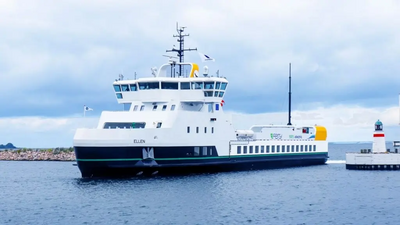Denmark's All-Electric Ferries are Showing the Way Forward for Short Sea Crossings Right Round Europe

Launched last August using a grants from E-Ferry, an EU-backed innovation fund, Ellen is Denmark's first electric ferry to dispense with diesel back-up generators.
It was built in the Ridzon shipyard in Szczecin in Poland and power is provided from large-format lithium ion batteries specially developed by the Swiss company, Leclanché. At €30 million it cost 40% more than a convention diesel-powered vessel, but the running costs are 75% less and the pollution is negligeable by comparison.
The Ellen can carry 30 vehicles and 200 passengers and is being used on the Fynshav - Søby and the Fåborg - Søby routes, each a distance of about 10 nautical miles with a journey time of just under an hour. It is designed to make 7 trips a day during the summer season and can travel 22 nautical miles on a full charge. It is owned and operated by the local council.

Søby is a small town on Ærø a Danish island between Jutland and Zealand, and a popular holiday destination for cyclists and walkers. The council operated bus service on the island is free of charge - but the taxis are not!
The electric ferries with diesel back-up have been operating for many years between Helsingør (on Zealand) and Helsingborg (in Scania) across the narrow end of the Øresund where it joins the Kattegat.
The EU is planning for 100 all-electric ferries in Europe by 2030 in such places as Greece and Scandinavia. They would of course be very sutable in Scotland and to the Isle of Man and the Channel Islands but this is now unlikely since participation in the E-Ferry fund is no longer available to the UK.
